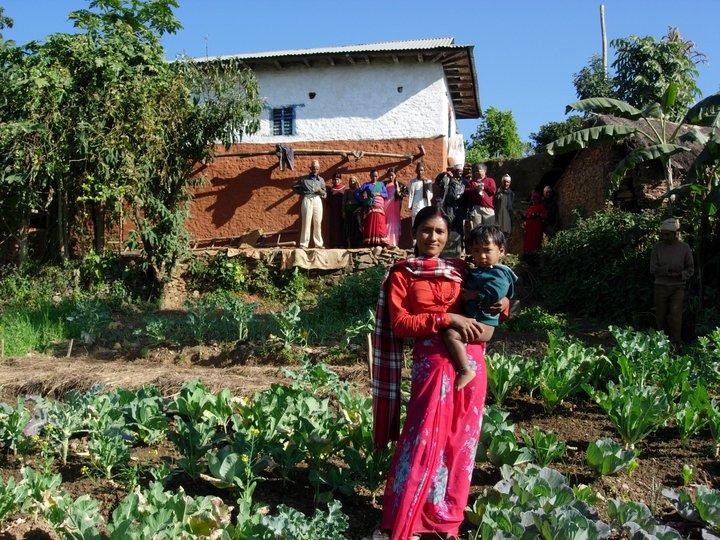M. Ann Tutwiler reflects on the Papal Encyclical

In her latest blog, M. Ann Tutwiler reflects on the key messages given in the recent Papal Encyclical about the importance of biodiversity to meet human needs.
In her latest blog, M. Ann Tutwiler reflects on the key messages given in the recent Papal Encyclical about the importance of biodiversity to meet human needs.
Bioversity International was recently honoured by the visit of Monsignor Fernando Chica Arellano, the representative of the Holy See to the UN agencies in Rome. During his visit to our headquarters, the Monsignor spoke passionately about the convergence between the messages in Pope Francis’ Encyclical on “Caring for Our Common Home” and Bioversity International’s mission: Agricultural biodiversity nourishes people and nurtures the planet.
Thus far, most of the attention on the Pope’s message has been on climate change, and the upcoming climate negotiations in Paris - but the Pope’s message on biodiversity is equally strong. Specifically, the Encyclical dedicates over 6 pages to biodiversity in the first chapter, noting, for example:
- Different species contain genes which could be key resources in years ahead for meeting human needs and regulating environmental problems.
- In assessing the environmental impact of any project, concern is usually shown for its effects on soil, water and air, but few careful studies are made on the impact on biodiversity.
- Greater investment needs to be made in research aimed at understanding more fully the functioning of ecosystems and adequately analyzing the different variables associated with significant modification of the environment.
I couldn’t agree more. At Bioversity International, our research demonstrates the important role biodiversity can play in addressing the challenges of meeting human needs: improving nutrition, reducing pest and disease damage and adapting to climate change. To implement these solutions, we combine our scientific evidence for improved practices, by building on and sharing the most important ‘technology’— the knowledge — between farmers and scientists.
A few examples:
- In India, our research is demonstrating that sun damage to wheat can be offset by planting a mix of wheat varieties with different flowering times – wheat is particularly sensitive to burning when it flowers.
- In Ecuador, we are demonstrating that when farmers grow three or more bean varieties in their fields, not only do yields improve by up to 32% through improved drought tolerance, but also that common bean rust is reduced by up to 50%.
- In Uganda, we are identifying banana varieties that, through a single banana, can meet a child’s daily requirement for vitamin A.
In his Encyclical, the Pope makes another important point: the analysis of environmental problems cannot be separated from the analysis of human, family, work-related and human contexts. In our research, we weigh the trade-offs and identify synergies to balance the need to improve human welfare today and the need to safeguard the biodiversity on which future human welfare depends.
The Pope also calls for collaboration and dialogue across sectors to address these challenges. In our work Bioversity International is working together with farmers, scientists, development and environmental organizations and the private sector.
Finally, the Pope calls for more investment in research to understand how ecosystems function. This message is resonating with the international community. Last week, at the United Nations’ Third International Conference on Financing for Development, senior government officials announced the Addis Ababa Action Agenda, committed to strengthen efforts to enhance food security and nutrition, focusing their efforts on smallholders, women farmers, agricultural cooperatives, and farmers’ networks. In the Action Agenda, governments also agreed to underpin all their actions with a strong commitment to protect and preserve the planet's natural resources including biodiversity, and climate.
We support and applaud these commitments and as we have done for the past 40 years, we will continue to work with farmers, researchers and the private sector in developing countries to promote healthy diets from sustainable food systems; to build profitable and resilient farms, forests and landscapes; and to use and conserve genetic resources effectively.
M. Ann Tutwiler
Read more blog posts from M. Ann Tutwiler, Bioversity International, Director General, at DG Dialogues
This blog is adapted from a speech presented at the special event: Our common home - a debate on the Encyclical Letter of Pope Francis, held on 20 July 2015. The Laudato Sì, Encyclical Letter by Pope Francis was as at the center of this debate, organized by the Centro Studi Americani and hosted by LUISS in Rome, Italy. Panelists debated various themes of the letter including the environment, energy, technology, finance and the media. Ms. Tutwiler was joined by Monsignor Marcelo Sánchez Sorondo, Chancellor of the Pontifical Academy of Science and the Pontifical Academy of Social Sciences of the Vatican and Victor Simpson, former Rome Bureau Chief for the Associated Press.
Photo: Farmer in her home garden, Nepal. Credit: Bioversity International/B. Sthapit
